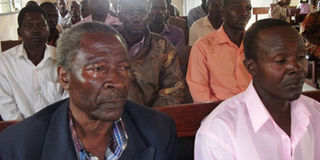Councillors divided over taxing traditional healers

To be taxed. Traditional healers and herbalists attend a meeting in Buwunga Sub-county, Masaka District recently. Mubende District plans to tax traditional healers as a way of regulating their activities. PHOTO BY ALI MAMBULE
What you need to know:
- Rates. Traditional healers dealing in providing herbal medicine will be paying Shs30,000 while those who own shrines will pay Shs 100,000 as tax annually.
MUBENDE. Mubende District councillors have clashed over a plan to tax traditional healers operating in the district, starting this financial year.
The new tax, according to councillors was prompted by the increasing number of traditional healers in the district.
Further in justifying the bid to tax the traditional healers, the councillors contend that they advertise on various radio stations boasting of how they have supernatural powers to make people rich and also heal various diseases, hence enabling them to reap big from the populace.
Mr Sheifu Magezi, Mubende District secretary for finance, said traditional healers dealing in providing herbal medicine will be paying Shs30,000 as tax every year, while those who own shrines will pay Shs 100,000.
“A big number of people involved in this business are making a lot of money and the district can only benefit from this sub sector by levying some tax, which we will use to provide services to the communities,” Mr Magezi said.
He added: “This will also help us regulate that business because many people have reported cases where traditional healers have conned them of money and property.”
But Mr John Kayengere, Nabingoola Sub-county councillor, opposed the move, saying traditional healers are doing a noble duty of treating poor Ugandans who cannot afford conventional medicine in private clinics.
He said levying taxes against traditional healers will prompt them to charge their patients more money yet they are poor.
“Who doesn’t know that 80 per cent of our people run to traditional healers for solace? If we choose to tax them, our people are going to suffer and I suggest that the district finds another source of revenue,” he added.
Ms Norah Mbabazi, a councillor representing Mubende Municipality, said taxing traditional healers will help reduce the number of fake healers who have of late infiltrated the trade .
“Taxing the traditional healers will help us monitor the kind of work these people are doing and also enable us know the wrong elements among them,” she said.
Mr Francis Kibuuka Amooti , the Mubende District chairperson explained that collecting taxes from the traditional healers is one of the ways through which they plan to boost their revenue base.
“We, therefore encourage all the parties involved to cooperate with our officials because this will enable us to eliminate fake healers that have been using this opportunity to extort money from people after promising to make miracles for them,” he said.
Traditional healers have for a long time been blamed for the recurrent cases of child sacrifice in central region, while some have been accused of raping women who visit their shrines .
In the last couple of years, Police in Luweero and Nakaseke districts have recorded several cases involving traditional healers who have raped women and extorted money from people under the guise of exorcising evil spirits from their bodies .
Cases of grave vandals experienced in Luweero and Kayunga districts are also blamed on traditional healers and residents accuse them of taking away the remains of the dead people.
A section of residents in both districts claim traditional healers use remains of dead to cast spells on their clients’ enemies.
However, this cannot be elaborately explained by practitioners or proven scientifically.


